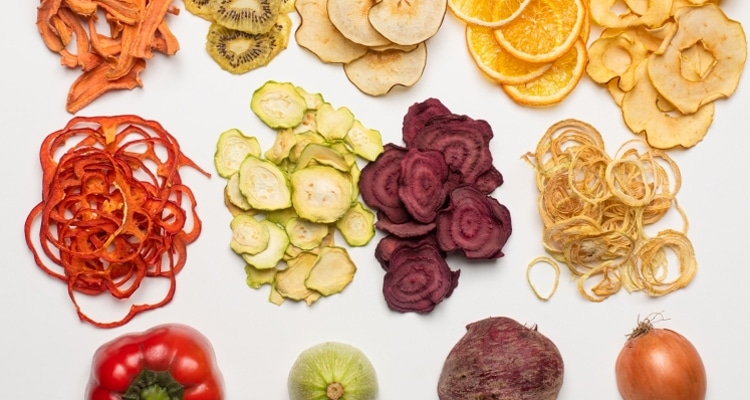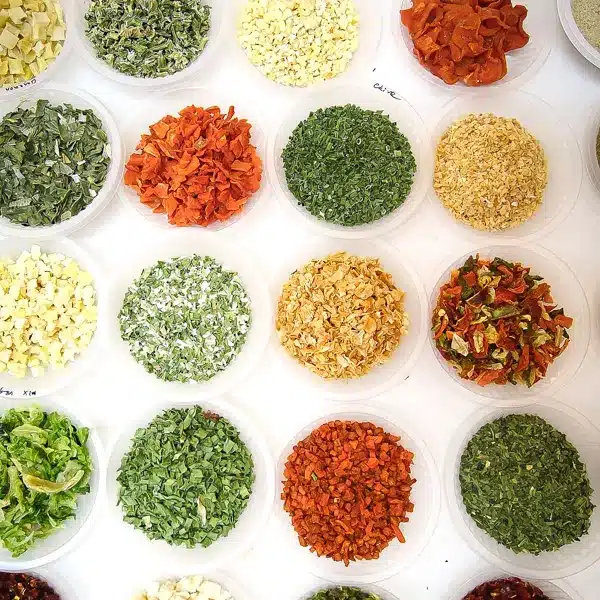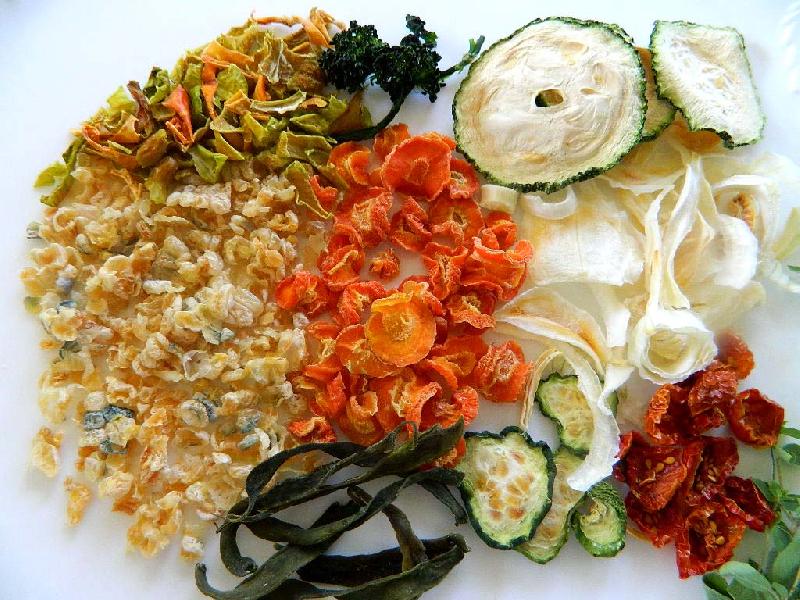Dehydrated vegetables are vegetables that have undergone the process of removing the moisture content, resulting in a concentrated form of the vegetable with a longer shelf life. The dehydration process involves removing the water content from the vegetables, which can be done using various methods such as sun drying, oven drying, or freeze-drying. Dehydrated vegetables are a popular ingredient in many dishes due to their extended shelf life and concentrated flavor. In this article, we will explore dehydrated vegetables, their benefits, and their technical information.
- Beetroot
- Cabbage
- Carrot
- Tomato
- Ginger
- Potato
- Green Chili

Dehydrated vegetables are vegetables that have been processed to remove their moisture content. This results in a concentrated form of the vegetable that can be stored for a longer period than fresh vegetables. The dehydration process can be done using various methods, including sun drying, oven drying, or freeze-drying. Dehydrated vegetables are a popular ingredient in many dishes and are commonly used in soups, stews, and other recipes.
Cooking with Dehydrated Vegetables: Benefits, Recipes, and Precautions
Dehydrated vegetables are an excellent option for individuals looking for a long-lasting and convenient food source. Dehydrated vegetables are lightweight, portable, and easy to store. They are an ideal option for hikers, campers, and survivalists who require lightweight, non-perishable food sources. Additionally, dehydrated vegetables retain most of their nutritional content, making them an excellent option for health-conscious individuals. In this article, we will discuss the benefits of dehydrated vegetables, how to rehydrate them, how to use them in recipes, provide some delicious dehydrated vegetable recipes, and highlight some precautions and potential side effects.
Benefits of Dehydrated Vegetables
Dehydrated vegetables have several advantages over fresh vegetables. Firstly, dehydrated vegetables have a much longer shelf life than fresh vegetables. Dehydrated vegetables can be stored for several months, even years, without spoiling. Secondly, dehydrated vegetables are more convenient than fresh vegetables. They are lightweight and easy to store, making them an excellent option for individuals who need a quick and easy food source. Lastly, dehydrated vegetables retain most of their nutritional content. The dehydration process preserves the vitamins and minerals found in fresh vegetables, making them a healthy option for individuals looking to maintain a nutritious diet.
There are several benefits to using dehydrated vegetables in cooking. Here are a few:
- Extended Shelf Life: Dehydrated vegetables have a much longer shelf life than fresh vegetables. This is because the dehydration process removes the water content, which is the main cause of spoilage in fresh vegetables.
- Concentrated Flavor: Dehydrated vegetables have a more concentrated flavor than fresh vegetables. This is because the dehydration process removes the water content, leaving behind a more concentrated form of the vegetable.
- Nutrient Retention: Dehydrated vegetables retain most of their nutrients during the dehydration process. This is because the process is done at a low temperature, which preserves the nutrients.
- Convenience: Dehydrated vegetables are easy to store and use. They take up less space than fresh vegetables and can be used in recipes without the need for preparation or washing.
Types of Dehydrated Vegetables
There are many types of dehydrated vegetables available, including:-
- Dehydrated Onions: These are onions that have been dehydrated and are commonly used in soups, stews, and other recipes.
- Dehydrated Potatoes: These are potatoes that have been dehydrated and are commonly used in instant mashed potatoes, soups, and stews.
- Dehydrated Carrots: These are carrots that have been dehydrated and are commonly used in soups, stews, and other recipes.
- Dehydrated Tomatoes: These are tomatoes that have been dehydrated and are commonly used in soups, stews, and other recipes.
- Dehydrated Peppers: These are peppers that have been dehydrated and are commonly used in soups, stews, and other recipes.

Dehydration Process
The dehydration process involves removing the moisture content from the vegetables. This can be done using various methods, including sun drying, oven drying, or freeze-drying.
- Sun Drying: This is the traditional method of dehydrating vegetables. It involves placing the vegetables in the sun to dry out. However, this method is not suitable for all vegetables, as some may spoil before they are fully dehydrated.
- Oven Drying: This method involves placing the vegetables in an oven at a low temperature for several hours. The temperature and duration vary depending on the type of vegetable being dehydrated.
Nutritional Benefits of Dehydrated Vegetables
Dehydrated vegetables retain most of their nutritional value even after the dehydration process. They are rich in vitamins, minerals, and fiber. Dehydrated vegetables are a good source of antioxidants, which help protect the body against damage caused by free radicals. Dehydrated vegetables also offer a convenient way to incorporate vegetables into your diet, especially if you don’t have access to fresh produce all year round. They are also a great way to reduce food waste as they have a long shelf life.
How to Dehydrate Vegetables
Dehydrating vegetables is a simple process that can be done at home. Here’s how to do it:
- Wash and dry the vegetables.
- Cut the vegetables into even-sized pieces.
- Blanch the vegetables by placing them in boiling water for a few minutes.
- Drain the vegetables and place them on a dehydrator tray.
- Dehydrate the vegetables at a temperature of around 125°F to 135°F for 6 to 12 hours, depending on the type of vegetable and the desired level of dehydration.
- Once the vegetables are fully dehydrated, remove them from the dehydrator and store them in an airtight container.
Storing Dehydrated Vegetables
Dehydrated vegetables should be stored in a cool, dry place, away from direct sunlight. They should be stored in an airtight container to prevent moisture from entering and spoiling the vegetables. If stored properly, dehydrated vegetables can last for up to a year or even longer. It’s important to check for signs of spoilage, such as mold or an off odor, before using them in your cooking.
Rehydrating Vegetables
Before using dehydrated vegetables in recipes, they must be rehydrated. To rehydrate dehydrated vegetables, place them in a bowl and cover them with hot water. Let them soak for approximately 10 minutes or until they become soft. Drain any excess water before using them in recipes.
Using Dehydrated Vegetables in Recipes
Dehydrated vegetables can be used in a wide range of recipes. They can be added to soups, stews, stir-fries, and salads. They can also be used as a snack or a side dish. When using dehydrated vegetables in recipes, it is essential to ensure that they are rehydrated adequately. Additionally, it is crucial to consider the texture of dehydrated vegetables. They may be softer or chewier than fresh vegetables, so it is important to adjust cooking times and temperatures accordingly.
Delicious Dehydrated Vegetable Recipes
Here are some delicious dehydrated vegetable recipes that you can try at home:
Tomato and Basil Soup
Ingredients:
- 1 cup of dehydrated tomatoes
- 1 onion
- 2 cloves of garlic
- 1 tablespoon of olive oil
- 4 cups of vegetable broth
- 1 teaspoon of dried basil
- Salt and pepper to taste

Instructions:
- Rehydrate the dehydrated tomatoes by placing them in a bowl and covering them with hot water. Let them soak for approximately 10 minutes or until they become soft.
- In a pot, sauté the onion and garlic in olive oil until they become translucent.
- Add the rehydrated tomatoes, vegetable broth, and dried basil to the pot.
- Bring the mixture to a boil, then reduce the heat and let it simmer for approximately 20 minutes.
- Using an immersion blender, blend the soup until it becomes smooth.
- Season the soup with salt and pepper to taste.
Tasty & Quality Approved Agricultural Products
are Available Here!
We supply and export great-quality Bold Peanuts, Java Peanuts, TJ Peanuts, Fresh Red Onion, White Garlic, Yellow Maize, Dry Red Chill and In Shell Peanuts with 100% customer satisfaction all over the world.

